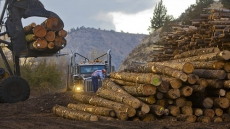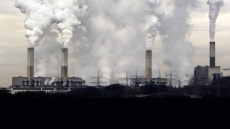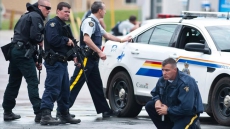EDMONTON — Canada is a land of extremes, from car-freezing cold to crop-searing heat and drenching rains to drought. But you ain't seen nothin' yet.
By 2050 — within the life expectancy of most Canadians — scientists say that if current emissions levels remain unchanged, climate change will be well established.
It will be warmer: a cross-country summertime average of about two degrees. It will be wetter, mostly, by about five per cent.
Those modest figures may sound good to a country that describes summer as four months of poor sledding. And global warming will bring perks, such as the chance to grow different or more abundant crops.
But gentle averages, however, are not what Canadians will experience. Climate change will feed into Canada's already considerable natural variability — and not to smooth it out.
"The kind of changes one anticipates are more likelihood of drought or more likelihood of wet periods," said Greg Flato, Environment Canada's top climate modeller.
"If you think about temperature extremes, as the climate warms the likelihood of getting a very hot extreme becomes greater; the likelihood of getting a very cold extreme becomes less likely."
The extra rain, for example, is unlikely to fall in a gentle spring shower. Look for it in great flooding downpours or winter rains that drain before they can nourish crops.
John Pomeroy, a Canada research chair in water resources at the University of Saskatchewan, points out the amount of water that falls as snow has already declined by 50 per cent on the Prairies. The number of multi-day rains has increased by the same amount.

"Farmers need to adapt to that, to being inundated and flooded quite a bit," he said.
Heat-loving crops like corn could become much more common in Canadian fields.
But water availability could limit the advantage of a longer growing season. Southern Canada's modest precipitation gains are expected to be lost through higher temperatures.
FOREST TO PRAIRIE
Milder winters allow mountain pine beetles to survive and infect forests in Alberta and Saskatchewan, killing trees and turning parched and overheated forests into tinder boxes.
Wildfire seasons already begin weeks before they used to. In the Northwest Territories, where temperatures are climbing faster than almost anywhere on earth, the 2014 fire season set a record of 3.4 million hectares of scorched forest.
Aspens, the most common leafy tree in the boreal forest, are dying at twice their historic norm, "part of a larger-scale pattern of climate-related dieback episodes," says Natural Resources Canada.
By 2050, look for big parts of the boreal forest's southern fringe to be brand-new prairie.
"Drought-prone spruce will be lost first, followed by pines and then aspen, to be replaced by some form of prairie grassland," said a 2009 report from the Canadian Council of Forest Ministers.
Glaciers, an important source of water for western cities during low-snow years, are on their way out, said Mike Demuth of the Geological Survey of Canada.
"Glaciers in the Rocky Mountains are pretty much going the way of the dodo bird," he said.
Nor do the changes stop with the land.
"We are already seeing (fish) species shifting their distributions," said William Cheung of the University of British Columbia. "Warmer water species from the south are appearing in the north area and some of the (northern) species are suffering because the ocean becomes too hot for them."
Look for overall catches off the Pacific coast to decline between four and 11 per cent by 2050, Cheung said. Salmon hauls will drop between 17 and 29 per cent, herring by up to half.
There is, however, good news.
West coast fishers can look for more pacific sardines and manila clams. In the Atlantic, catches are expected to increase — as long as fishers can sail further north.
"Smaller-scale fisheries may not be able to fish from their home ports a lot further," Cheung said.
Commercial fisheries could also open in an ice-free Arctic Ocean, with turbot, Arctic cod and Arctic char. But much science is needed to determine if those fisheries are sustainable.
"It will be risky," Cheung said. "Once fisheries have developed, it's very difficult to scale it down."
THE HIDDEN DRIVER
Canadians will also have to deal with climate change's global impacts.
"It complicates the U.S.-Canada relationship," said Rob Huebert from the Centre for Military and Strategic Studies at the University of Calgary.
"We know that in the southwest (U.S.) they're pretty much getting maxed out in terms of available water sources. In a United States that is water-deprived, they're automatically looking northward."

Climate will be a hidden driver behind many difficult foreign situations, said Huebert. Refugees, fleeing expanding African deserts or the strife caused thereby, will be knocking on Canada's door.
"What I'm seeing is an acceleration in the collapse of some of these societies and it seems to be coming from the expansion of the desert," Huebert said. "(Climate change) definitely seems to be an intervening variable that is exacerbating the situation.
"It's the accelerator of what's already a bad situation."
Some worry current predictions are too conservative.
"All the work we've done may be falling apart because nobody expected to see the Arctic exploding with heat," said University of Lethbridge climate modeller James Byrne.
Even with this year's El Nino, Byrne said the Arctic is falling apart faster than anyone thought it would.
January was the ninth straight month of record-breaking global warmth and saw the greatest departure from average of any on record, says NASA. It was hottest in the Arctic — four degrees above normal.
"The scenarios are challenging to interpret at this point," Byrne said. "How much faith can we really have in them? I'm worried about that."
Most climatologists say the big impacts — especially if the world doesn't reduce its carbon emissions — don't even start until after 2050.
Climate change forecasts, said Flato, only predict more uncertainty.
"We don't know where that ultimate change will be," he said.
"It's a bit worrisome, not knowing what the future will be for my son or my grandchildren. The uncertainty of where it will get to is a worry to me."




